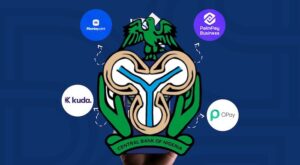CONTENTS.
-
ECONOMY.
-
CAPITAL MARKET.
-
FINTECH.
ECONOMY.

Recapitalisation.
The Central Bank of Nigeria (CBN) announced an upward review of Nigeria’s minimum capital requirement for commercial, merchant, and non-interest banks.
On March 28, 2024, the Central Bank of Nigeria (CBN) announced some exciting news for the banking industry in Nigeria. The CBN has decided to increase Nigeria’s minimum capital requirement for commercial, merchant, and non-interest banks. This is a great step towards strengthening the banking sector and making it more reliable. Banks have been given a two-year timeframe from April 01, 2024, to March 31, 2026, to meet these new capital requirements. This is an excellent opportunity for banks to strengthen their business and improve their services. (see table 1)
| Type of Bank | Authorisation | Minimum Capital (N’Billion) |
| Commercial | International | 500 |
| National | 200 | |
| Regional | 50 | |
| Merchant | National | 50 |
| Non-Interest | National | 20 |
| Regional | 10 |
It is interesting to learn about the banking sector recapitalisation programme, which is a regulatory initiative of the CBN. Banks are required to increase their minimum paid-in common equity capital to a specified amount within two years, based on their license category. I also heard that banks have the option to downgrade the scope of their activities in exchange for lower capital requirements. It seems like a significant step to strengthen the banking sector and ensure stability in the financial system.
The overall aim of the recapitalisation is to ensure that Nigerian banks can take bigger risks and stay afloat in times of trouble, support different sectors of the economy, and improve confidence in the banking system.
The Banker recalled that the last bank recapitalisation was in 2005 when the minimum capital requirement for national commercial banks was increased from N2.0bn to N25.0bn (equivalent to $187m and worth only $32.5m today). This reduced the number of banks from 89 to 24. There have been 10 different phases of recapitalisation between 1952 and 2005 in Nigeria.
What are the implications?
For Banks, it means increased liquidity in the banking sector could lower lending rates in the medium to long term., and a stronger ability to absorb loan losses and withstand economic shocks.
He stated that a larger capital base will enable banks to underwrite bigger levels of credit in the economy and ultimately generate higher income. The new single obligor limit based on the new capital will enable banks to finance larger ticket transactions.
It will lead to a potential increase in the cost of capital due to the higher cost of equity capital relative to debt.
“The banks must work harder to ensure that the capital raised is deployed in profitable opportunities to create value for investors.
The economy of Scale: The Tier-1 banks control over 70 percent of total assets and revenue in the sector. This implies that scale has a major role to play in this space. The recapitalisation will reposition the banks to be more efficient, resulting in increased capacity.
Looking at the implication for the economy, Ebo said a stronger financial system will provide great support for the Nigerian economy as it works towards evolving into a $1.0tn economy in 2030.
Initial loss of jobs due to mergers and acquisitions or downgrade of licence (e.g. from national to regional will mean reduced number of branches).
Increased business for capital market players: Equity capital raises involve several stakeholders in the capital market, including investment bankers, regulators, solicitors, and so on. “Hence, we expect improved earnings from fees from the capital raise.”
Johnson Chukwu, the group managing director/CEO of Cowry Asset Management Limited, voiced his opinions and concerns, emphasizing the premature nature of speculating about potential bank mergers, stating, “I think it’s very presumptuous to talk about which bank is going to merge.”
He highlighted that banks have a 24-month window to recapitalize, urging stakeholders to focus on each bank’s action plan. He emphasized the need to await the submission of these plans to the CBN by the end of the next month before discussing potential mergers or acquisitions.
Chukwu’s insights shed light on the complexities and considerations surrounding the CBN’s recent directive, sparking a broader discussion within the banking industry about the most effective strategies for meeting the recapitalization requirements while optimizing shareholder value.
The options from which the CBN allows banks to source capital include: injecting fresh equity capital through private placements, rights issues and/or offers for subscriptions, mergers and acquisitions (M&As); and/or upgrade or downgrade of licence authorisation.
“This implies that banks can only raise capital via equity. The debt capital option is excluded,” Ebo said.
In other words, in a Nigerian context, the CBN’s effort to raise bank capital could have long-term benefits, but investors may see no short-term benefits as bank earnings per share (EPS) and dividends fall.
Bank capital should combine individual bank operational reviews (to ensure that prudential capital adequacy ratios (CARs) are met) and CBN regulatory oversight (to ensure that each bank satisfies the minimum requirements of the regulator’s capital stress test). Being overcapitalised is just as dangerous as being undercapitalised.
CAPITAL MARKET.

Stakeholders to strengthen commodities exchange.
In recent news, the Senate has collaborated with key players in the capital market to strengthen the commodities exchange and maximize its capabilities.
Osita Izunaso, the chairman of the Senate Committee on Capital Market, shared this information during a workshop for committee members held in Abuja on Sunday, under the theme “Infrastructure Financing Development of the Commodities Ecosystem through Commodities Exchanges”.
Izunaso emphasized the importance of cooperation between the executive and legislative branches to enhance the commodities exchange to meet global market standards.
He explained that the workshop aimed to align the commodities exchange to facilitate food security and boost foreign exchange earnings. Izunaso highlighted that people usually focus on the money and capital markets, neglecting the commodities market.
Therefore, the Senate is partnering with the Lagos Commodities and Futures Exchange to bring this matter to the forefront. The ultimate objective is to ensure that all export commodities in Nigeria pass through the commodity exchange to generate revenue for the country.
Commodities exchanges are instrumental in investment diversification, risk management, fair pricing, and efficient transactions.
Moreover, Centrum Finance’s team of qualified business developers can provide advice on Commodity Finance for non-interest prospects on our Commodity Finance product (Mudarabah). Click for more information.
FINTECH

CBN Orders Fintech Firms To Suspend Onboarding of New Customers.
It has been reported that several fintech firms including OPay, Palmpay, Kuda Bank, and Moniepoint have been under scrutiny due to allegations that their accounts were used for illicit foreign exchange transactions.
The Central Bank of Nigeria (CBN) has issued a directive to freeze the accounts of these fintech companies. Representatives from two of the companies have acknowledged that the directive is connected to the allegations and expressed concerns that it might be misdirected.
They have highlighted that the majority of the implicated accounts are held by commercial banks rather than fintech platforms.
The Economic and Financial Crimes Commission (EFCC) has obtained a court order to freeze at least 1,146 bank accounts owned by individuals and companies allegedly involved in illegal foreign exchange transactions.
The EFCC is investigating other offences including money laundering and terrorism financing. The EFCC stated that the accounts were linked to individuals exploiting virtual cryptocurrency exchange platforms to manipulate the Naira’s value illegally and launder proceeds from unlawful activities. Despite a court order citing most of the accounts involved in alleged illegal forex trading as commercial bank accounts, the banks have been instructed to halt new customer onboarding.
Justice Emeka Nwite, in a ruling on the ex-parte motion presented by the anti-graft agency’s lawyer, Ekele Iheanacho, granted the commission’s request to conclude the investigation within 90 days.
Although the verdict was issued on April 24, its certified true copy was provided on Monday.
The EFCC stated in its request for the account freeze that its preliminary investigation indicated the accounts were linked to individuals exploiting virtual cryptocurrency exchange platforms to manipulate the Naira’s value illegally and launder proceeds from unlawful activities.
It cited the necessity to preserve the funds in the identified accounts pending the investigation’s conclusion and potential prosecution.
In conclusion, this is the period to take your financial journey seriously, be knowledgeable about the volatility of the banking sector, invest wisely and put your money where it will not get lost. Our financial advisors are always available to guide and educate you on your pathway to financial freedom and growth. Contact us today.
SOURCES: centrumfinanceltd, nairametrics, Proshare, Arisenews, Businessday.
DISCLAIMER
This publication is produced by Centrum Finance Company Limited solely for the information of users who are expected to make their own investment decisions without undue reliance on any information or opinions contained herein. The opinions contained in the report should not be interpreted as an offer to sell, or a solicitation of any offer to buy any investment. Whilst every care has been taken in preparing this document, no responsibility or liability is accepted by any member of the Company for actions taken because of the information provided in this publication.

